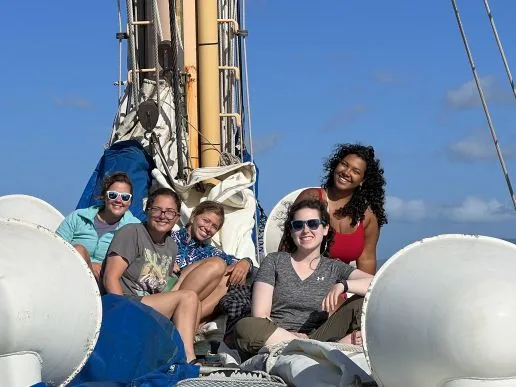Programs Blog
A Warning to Loved Ones

May 9, 2023
Matt Bihrle, Assistant Scientist, B Watch
Ship’s Log
Noon Position
21 19.0’N x 157 52.6’W
Ship Heading
000
Ship Speed
Taffrail Log
Weather / Wind / Sail Plan
Description of location
Alongside in Honolulu
As of about 0900 this morning our ship’s company completed its first full 24 hours on land in about a month. Yesterday was full of all of the excitement of coming into the dock. We threw heaving lines, rigged the gangway, cleared customs, filled up on fresh water, took our first steps on solid ground, talked to loved ones and had our first glorious bites of ice cream or sips of iced coffee. After a couple hours set free ashore we came back abuzz. “Where’d you go?!” “Isn’t walking crazy?” “I missed you all!”
Today was a bit quieter. Partially, because the ships company was split for most of the day; the students worked on their papers off the ship while the staff stayed behind to work on projects. Partially, I think, because the ship’s company is working through the transition back to land. We’ve spent so much time learning to pay attention to our shipmates, our ship, and our environment at sea and it feels strange to detangle that web of interconnectedness. Over dinner, we talked about how we would describe this experience to our loved ones. How difficult it will to convey this experience in words let alone get someone to listen to all of it! My brain immediately went to “If You Give a Mouse a Cookie.” If I mention the sunsets, how can I not mention the sunrises? If I mention the sunrises what about the stars? Or the clouds? Or the waves that threw me into the wall while cleaning the heads? Or the waves bigger than I had ever seen? Or the swell I learned to see beneath wind waves? Or the stories of the shipmate who taught me to see the swells? Or the fact that I know that shipmate’s favorite song, and what excites them, and what chores they hate but still blank on their last name?
Once one detail comes out, how can we not include everything else? Every last bit of it is meaningful.
Unfortunately, none of us had much for answers, but I think that’s just how this goes. This transition is hard, and we can do things to make it easier on ourselves and our loved ones but we can’t get rid of the discomfort entirely. So to those reading the blog I offer a warning:– Your loved one might need lots and lots of sleep, check their pulse every so often.
– They might expect snacks and meal every 3 hours. It’s okay to tell them to get it themselves.
– If they start going down to the basement every hour saying something about the “forward machinery space,” just tell them someone else did the boat check.
– If you notice them looking a little lost, ask them “mark your head?” and they’ll snap back into it.
– They may be a little crankier than usual or they might have newfound energy.
– They might want to talk for hours and hours, or they might not know what to say at all.
– They may tell stories that don’t quite make sense, or have words they never explained to you. Know that just listening means a lot.
For those of us onboard I offer a quote: “If a thing is worth doing, it is worth doing badly.”-G.K. Chesterton. It is a worthwhile thing to try and describe this experience even if we cannot encompass all of it. It is a worthwhile thing to try and rest, to try and process, and to try and remember the memories and the lessons.
Transitions are messy, but they are a worthwhile thing. It would be so much easier to transition back to land if we had not grown so much at sea. And that is a wonderful thing.
Matt Bihrle, Assistant Scientist, B Watch
https://sea.edu/wp-content/uploads/2023/05/blog-photo-1-May-9.jpg
Recent Posts from the Ships
- Ocean Classroom 2024-A collaborative high school program with Proctor Academy
- Collaborations and Long-term Commitments: SEA’s Caribbean Reef Program Sets a Course for Coastal Programs that Compliment Shipboard Experiences.
- Sea Education Association students prepare for life underway using state of the art nautical simulation from Wartsila Corporation.
- SEA Writer 2022, Magazines From the Summer SEA Quest Students
- Technology@SEA: Upgrades Allow Insight into Ocean Depths
Programs
- Gap Year
- Ocean Exploration
- High School
- Science at SEA
- SEA Expedition
- SEAScape
- Pre-College
- Proctor Ocean Classroom
- Protecting the Phoenix Islands
- SPICE
- Stanford@SEA
- Undergraduate
- Climate and Society
- Climate Change and Coastal Resilience
- Coral Reef Conservation
- Marine Biodiversity and Conservation
- MBL
- Ocean Exploration: Plastics
- Ocean Policy: Marine Protected Areas
- Oceans and Climate
- Pacific Reef Expedition
- The Global Ocean: Hawai'i
- The Global Ocean: New Zealand